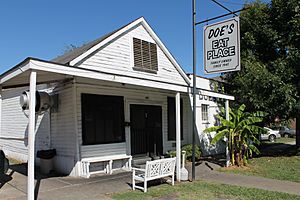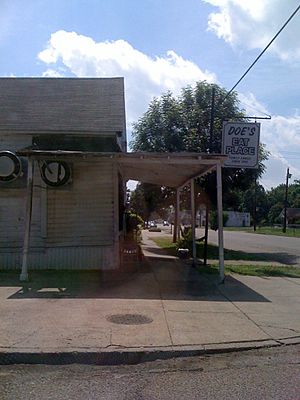Doe's Eat Place facts for kids
Doe's Eat Place is a famous chain of restaurants in the United States. It started in Greenville, Mississippi, in 1941. Dominick "Big Doe" Signa and his wife, Mamie, opened the first restaurant.
Big Doe's father moved to Greenville in 1903. He opened a grocery store in the same building where the restaurant is today. The Signa family lived in a house right behind the store. They called their grocery store "Papa's Store." It did quite well until the big Great Mississippi Flood of 1927.
After the flood, Big Doe Signa needed to help his family. He started a business selling illegal alcohol. This was during a time when alcohol was not allowed to be sold openly. After several years, he stopped this business. He sold his equipment for $300 and a Ford Model T car.
Contents
How Doe's Eat Place Began
At first, Big Doe ran a place for entertainment in the front of the store. This spot was mainly for African Americans. They served buffalo fish and chili there. Because of the rules about racial separation at the time, white people usually did not go into Doe's.
Serving Steaks in Secret
One day, a local white doctor started stopping at Doe's for a meal. He would eat between his house calls. Big Doe would serve him steaks in the back of the store. Soon, more people heard about these delicious steaks.
Big Doe then decided to open a restaurant in the back of the building. For a short time, both the entertainment spot and the restaurant were open. As the restaurant became more and more popular, the entertainment spot eventually closed. The restaurant has welcomed people of all races since it first opened.
Passing Down the Business
"Big Doe" retired in 1974. He gave the restaurant business to his two sons, Doe Jr. and Charles. Doe Sr. passed away on April 27, 1987. His wife, Mamie, had passed away earlier, on November 5, 1955.
The Original Greenville Location
The very first Doe's Eat Place is still in the same building where it started. It is a small and simple building in an older neighborhood. Inside, the dining area looks clean and well-kept.
Many people describe Doe's as having a "cozy" or "classic" feel. Customers usually walk through the kitchen to enter the dining area. A member of the Signa family often greets them there.
Special Recognition
The original Doe's Eat Place in Greenville has received special honors. In 2007, the James Beard Foundation added it to their list of "America's Classics." This award celebrates timeless restaurants.
In 2012, the Greenville location was also listed in the National Register of Historic Places. This means it is an important historical site in the United States.
 | Jewel Prestage |
 | Ella Baker |
 | Fannie Lou Hamer |



